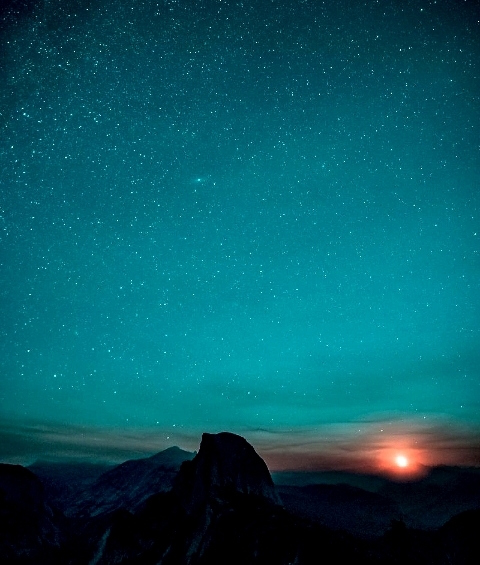
By Yuan-Sen Ting
As an astrophysicist, I would often find myself in awkward situations whenever I return to my hometown during Chinese New Year. My relatives like to bombard me with a myriad of true or false questions such as "do aliens exist?", "have UFOs visited earth before?" and "is there a physical end to the universe?". Of course, I could have taken the easy way out and say, "No, no, and no." However, that would be a betrayal to the spirit of science. Questions related to science are better not to be constructed in the "true or false" format, and this is especially true when it comes to my specialization, astrostatistics. The more accurate answer to their question would be: "probably not."
I know that all of you might be tempted to stop reading this column at the mention of the word "statistics." But please stay for a moment, as I will be devastated if you leave. Here I'm going to give you an example of how statistics can be tremendously useful in real life. Take the example of coronavirus. I currently live in the United States. The United States is a very developed country, isn't it? Let's say that I tested positive for the coronavirus in the United States. Theoretically, in comparison to if I were to test positive for the virus in Malaysia, I should feel a little more at ease. But statistically, it's the exact opposite. If I were to receive a positive COVID-19 test result in Malaysia, I would stay collected and consider doing a second test. But if the same happens to me in the United States, I would be tremendously worried. Why is that so? To understand this, we would need to know a little bit about statistics.
The life philosophy of a virgin
I'm in the United States, where the coronavirus situation is terrible. At the time this column is written, more than nine million people in the country have tested positive for the virus. If we were to include those who aren't tested, such as myself who are residing in New Jersey, some (unofficial) mathematically models estimate that up to one out of five people might have already caught the virus before.
So, let's say that my test result is positive. Statistically, what would be the probability that I have the virus? To answer this, we would have to take a few factors into consideration. The first one would be how accurate the test is. If the test is 100% accurate, the fact that I tested positive would mean that I definitely have the virus. However, please be aware that even though the test for the coronavirus is reasonably reliable, its exact accuracy is still up in the air. This means that a positive test result doesn't guarantee the presence of the virus. So, the second factor to be considered when deducing the probability of whether someone has the virus would be his or her "prior." In this case, the prior knowledge would be the probability of the person having the coronavirus before he or she received her test result.
That sounded complicated, right? It's actually not. Let me give you a more straightforward example. Let's say that I tested positive for a sexually transmitted disease (STD). What would be the probability that I have it? Please be aware that I have been a proud/sad virgin all my life, so unless the test is proven to be 100% accurate, my prior knowledge tells me that the result is highly likely to be a false positive and that I should get myself tested for a second time.
Going by the same theory, if I were to test positive for the coronavirus in the United States, because of my objective environment– the gravity of the virus situation in the country, it is highly probable that I do have the disease. And I didn't make this conclusion just because the United States has a high number of cases. It is because, at the same time, my positive test result gave me additional information that supported my prior knowledge.
"What are you trying to prove with your research?"
The study of astrophysics, and even science at large, is a process of continuously modifying the prior knowledge we have about nature, just like how we do with someone who tests positive for the coronavirus. The new information we receive will constantly affect our original perception of things. Sometimes, the data observed would match with our expectations (or "prior"). However, there are times when new information contradicts our prior knowledge, debunking it.
Here is a fun anecdote. My parents never understand what I do for a living and often ask me this question: "What are you trying to prove with your research?" As a matter of fact, I'm not attempting to prove anything. On the contrary, I conduct research to prove things wrong. Being able to be proven wrong forms the basis of science. What we astrophysicists are doing is to find inconsistencies in the field of modern astrophysics, which is already relatively thorough. This is a little like testing for the coronavirus. Of course, it's better to get a negative test result just like everyone else. However, a positive test result would be vastly more "interesting." That said, whether we're talking about scientific research or the coronavirus, we'll have to refer to our prior knowledge to decide on what to do with the positive test result.
But wait! Did I just imply that everything under the sky is possible, and nothing can be absolutely certain. So, could it be that scientists might have made up stuff like black holes and dark matter out of thin air? This is obviously not the case, and there are clearly "facts." Let me expand upon this using an example. The reason why it is taken as a "fact" that the sun rises from the east is that everyone can observe the sun doing the same, day after day. Hence, all of us can state this "fact" with confidence. Going by the same theory, we talk about black holes and dark matter on the premise that there are multiple types of research and a large amount of data that supports their existence. With these pieces of evidence, our prior knowledge becomes irrelevant (as long as it is not absolute and allows data to update one's prior knowledge). It's just like how no matter which country in the world a person is from, it would be a terrible idea for him or her not to seek treatment even after testing positive for the coronavirus ten times.
However, one has to be extremely careful if something just happens to contradict one's five senses or original perceptions. The renowned astrophysicist, Carl Sagan, has something to say about astounding claims– "Extraordinary claims require extraordinary evidence." A highly unusual claim that defies our "prior" requires more than just an anecdotal observation. In the analogy of the coronavirus, since the coronavirus situation in Malaysia is relatively under control, don't panic when you receive a positive test result (or, in my case, a positive STD test). But do get yourself tested for a second time until you have enough proof to revise your prior knowledge.
We can never be too certain about anything
I've never believed that the purpose of science is to offer an explanation to everything. This is also why I'm more often than not unable to bring myself to answer my relatives' true or false questions. When we give something a black and white answer, we're indirectly treating science as a series of fixed rules. This is a massive betrayal to the spirit of science.
Aside from science, humanities, the arts, and philosophy are also interrelated lenses that we can view life from. Ultimately, at the core of science lies a spirit– we can never be too certain about anything, and we should allow new observations to change our original perceptions. This spirit doesn't just apply to science, but also to life at large. And this general idea is perhaps best summarized by the famous French philosopher Voltaire — "Uncertainty is an uncomfortable position. But certainty is an absurd one."
(Yuan-Sen Ting is an astrophysicist. Yuan-Sen obtained his Ph.D. in astrophysics from Harvard University in 2017. He is currently a researcher working at the Institute for Advanced Study in Princeton, funded through a NASA Hubble Fellowship. Yuan-Sen is also an incoming faculty member at the Australian National University.)
ADVERTISEMENT
ADVERTISEMENT


































